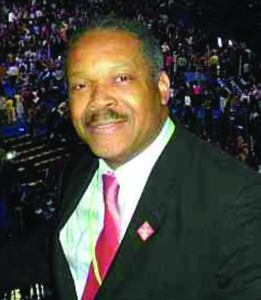Recently, there have been a number of legislative issues relevant to ICSOM musicians that have been considered (or even resolved), including the protected status of Pernambuco wood, the primary material used to produce bows for string instruments, as well as a push for musician-friendly legislation in Congress.
On November 28, 2022, Heather Noonan, League of American Orchestras Vice President for Advocacy, sent along a message regarding the Pernambuco issue.
Pernambuco Updates From CoP19

League of American Orchestras Vice President for Advocacy Heather Noonan
Photo Credit: Heather Noonan
Improvements for the movement of musical instruments across borders and new support for the conservation of Pernambuco wood won approval at the conclusion of two weeks of global negotiations in Panama City, Panama. From November 14 to 25, 2022, the 184 worldwide parties to the Convention on International Trade in Endangered Species of Wild Fauna and Flora (CITES) participated in the 19th Conference of the Parties (CoP19), where international governments adopted policies that balance trade and conservation needs for threatened plant and animal species.
The League of American Orchestras partnered with the International Pernambuco Conservation Initiative, French Musical Instrument Organization (CSFI), National Association of Music Merchants (NAMM), the American Federation of Musicians of the United States and Canada, and dozens of international music stakeholders in advance of the meeting to represent the music sector in policy conversations that determine future rules for travel and trade with musical instruments made with material subject to endangered species protections.
At a special briefing on November 14, the first day of negotiations, United States head of delegation Matthew J. Strickler, US Department of the Interior Deputy Assistant Secretary for Fish and Wildlife and Parks, outlined the proposals, and following their approval on November 25 said, “Music is an essential part of cultures around the globe, and sharing music internationally helps bring us all closer together. Many musical instruments are made with components from CITES-listed species but musicians traveling between countries to perform with these instruments does not pose a conservation risk. At CoP19, the United States was pleased to include consideration of additional efficiencies for the non-commercial movement of musical instruments, including through simplifying electronic permitting.”
The new Pernambuco policy that was approved on November 25 goes into effect in 90 days and keeps the species in its current Appendix II listing, with revised rules that place CITES permit requirements of finished bows (and all Pernambuco wood) the first time they leave Brazil (exports). Finished bows that cross a border after the wood previously left Brazil is some form as an export will remain exempt from new CITES requirements.
To read the full bulletin or learn more information on this issue, please visit: https://americanorchestras.org/global-negotiations-support-musical-instruments-and-pernambuco-conservation/
AFM Legislative Director Alfonso Pollard, who has partnered with Heather and the League on the Pernambuco issue, has also been very busy. I asked Alfonso to share important ongoing AFM legislative activities with us.
Congressional Efforts from the AFM

AFM Legislative Director Alfonso Pollard
Photo Credit: Jane McDonald
The American Music Fairness Act (H.R.4130 and S.4932)
The American Music Fairness Act (AFMA), which will require terrestrial AM/FM broadcast radio stations to finally pay royalties to musicians, backup singers and other creative professionals, whose music they play on their respective stations, has—after a year of lobbying—been favorably reported out by the House Judiciary Markup Committee on Wednesday December 7, 2022. With possible new restrictions placed on the 2022 Omnibus bill the Music First Coalition planned to use as a transmitting vehicle, the path toward final House passage is still not yet complete, though lobbying efforts continue to “work the four corners of the House and Senate Judiciary Committees.” Unfortunately, as this was being written the week before Christmas, the AFM learned that we were unsuccessful getting AMFA included in the final omnibus bill.
The Performing Artists Tax Parity Act (H.R.4750 and S.2872)
Sponsored by Representatives Judy Chu (D-CA) and Vern Buchanan (R-FL) with 87 cosponsors, and Senators Mark Warner (D-VA) and Bill Hagerty (R-TN) with 15 cosponsors, the Performing Artists Tax Parity Act is being managed in cooperation with the Department of Professional Employees (DPE) and its affiliate lobbying team. H.R.4750 resides in the House Ways and Means Committee while S.2872 resides in the Senate Finance Committee. Unfortunately, an end of the year tax vehicle has yet to be identified to serve as a catch-all tax bill, and work continues to bring more Republican co-sponsors onto the bill. The AFM is also closely monitoring the Tax Fairness for Workers Act, H.R.2549 and S.1157, championed by the American Federation of State, County and Municipal Employees (AFSCME) which also restores tax fairness to workers who lost benefits, particularly the loss of the union dues deduction, under the Trump Tax Cuts and Jobs Act of 2017.
DPE’s NEA & NEH Campaign
This campaign, developed to join other national arts agencies across the country in creating a labor campaign encouraging the US Senate to match the House funding levels for fiscal 2023. With authorization from AFM President Ray Hair and Secretary-Treasurer Jay Blumenthal, the AFM engaged this DPE federal arts funding email campaign, which was sent September 20, 2021, that achieved the results inset below.
NEA/NEH Email Campaign“Tell Your Senators to Support Federal Arts Funding”
Total Sent: 51,348
Total Opens: 24,811
Total Clicks: 2,097
Note: Although all AFM members support these federal agencies, our response rate to most emails are usually driven by the impact of the issue on their specific jobs.
PEACE through Music Diplomacy Act (H.R.6498)
The Promoting Peace, Education, And Cultural Exchange (PEACE) through Music Diplomacy Act would provide additional funds to the State Department for foreign travel. It would authorize music-related exchange programs facilitated by the Department of State that would include coordination and consultation with the private sector working with groups and individuals from other countries in nonprofit activities in the US, similar to certain artistic and sports activities when such participation is in the national interest. State Bureaus of Education and Cultural Affairs (ECA) will manage—including private sector coordination and consultation—programs focused on music and the performing arts that provide opportunities to build cross-cultural understanding and advance peace abroad. States should also seek to expand networking and mentorship opportunities as well as identify private sector funding sources for travel and other expenses.
My thanks to Heather Noonan and the LAO for their work on issues specific to our orchestral field, and to Alfonso Pollard for his work on behalf of all musicians that help make our lives richer. I hope you will all support these many worthy efforts as they move through Congress.





